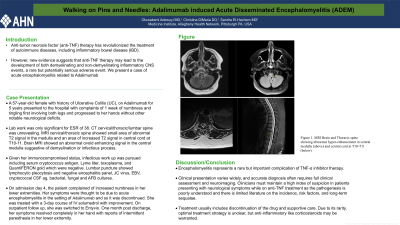Sunday Poster Session
Category: IBD
P0821 - Walking on Pins and Needles: Adalimumab Induced Acute Disseminated Encephalomyelitis (ADEM)
Sunday, October 22, 2023
3:30 PM - 7:00 PM PT
Location: Exhibit Hall

Has Audio
- OA
Oluwakemi Adewuyi, MD
Allegheny Health Network
Pittsburgh, PA
Presenting Author(s)
Award: Presidential Poster Award
Oluwakemi Adewuyi, MD, Christina DiMaria, DO, Sandra El-hachem, MD
Allegheny Health Network, Pittsburgh, PA
Introduction: Anti-tumor necrosis factor (anti-TNF) therapy has revolutionized the treatment of autoimmune diseases, including inflammatory bowel disease (IBD). However, new evidence suggests that anti-TNF therapy may lead to the development of both demyelinating and non-demyelinating inflammatory neurological events, a rare but potentially serious adverse event. We present a case of acute encephalomyelitis related to Adalimumab.
Case Description/Methods: A 57-year-old female with history of Ulcerative Colitis, on Adalimumab for 5 years presented to the hospital with complaints of 1 week of numbness and tingling first involving both legs and progressed to her hands without any other notable neurological deficits. Lab work was only significant for ESR of 38. CT cervical/thoracic/lumbar spine was unrevealing. MRI cervical/thoracic spine showed small area of abnormal T2 signal in the medulla and an area of increased T2 signal in central cord at T10-11. Brain MRI showed an abnormal ovoid enhancing signal in the central medulla suggestive of demyelination or infectious process. Given her immunocompromised status, infectious work up was pursued including serum cryptococcus antigen, Lyme titer, toxoplasma, and QuantiFERON gold which were negative. Lumbar puncture showed lymphocytic pleocytosis and negative encephalitis panel, JC virus, EBV, cryptococcal CSF ag, bacterial, fungal and AFB cultures. On admission day 4, the patient complained of increased numbness in her lower extremities. Her symptoms were thought to be due to acute encephalomyelitis in the setting of Adalimumab and so it was discontinued. She was treated with a 3-day course of IV solumedrol with improvement. On outpatient follow up, she was switched to vedolizumab. One month post discharge, her symptoms resolved completely in her hand with reports of intermittent paresthesia in her lower extremity.
Discussion: Encephalomyelitis is a rare but important complication of TNF-α inhibitor therapy. Clinical presentation varies widely, and accurate diagnosis often requires full clinical assessment and neuroimaging. Clinicians must maintain a high index of suspicion in patients presenting with neurological symptoms while on anti-TNF treatment as the pathogenesis is poorly understood and there is limited literature on the incidence, risk factors, and long-term sequalae. Treatment usually includes discontinuing the drug and supportive care. Due to its rarity, optimal treatment strategy is unclear, but anti-inflammatory like corticosteroids may be warranted.

Disclosures:
Oluwakemi Adewuyi, MD, Christina DiMaria, DO, Sandra El-hachem, MD. P0821 - Walking on Pins and Needles: Adalimumab Induced Acute Disseminated Encephalomyelitis (ADEM), ACG 2023 Annual Scientific Meeting Abstracts. Vancouver, BC, Canada: American College of Gastroenterology.
Oluwakemi Adewuyi, MD, Christina DiMaria, DO, Sandra El-hachem, MD
Allegheny Health Network, Pittsburgh, PA
Introduction: Anti-tumor necrosis factor (anti-TNF) therapy has revolutionized the treatment of autoimmune diseases, including inflammatory bowel disease (IBD). However, new evidence suggests that anti-TNF therapy may lead to the development of both demyelinating and non-demyelinating inflammatory neurological events, a rare but potentially serious adverse event. We present a case of acute encephalomyelitis related to Adalimumab.
Case Description/Methods: A 57-year-old female with history of Ulcerative Colitis, on Adalimumab for 5 years presented to the hospital with complaints of 1 week of numbness and tingling first involving both legs and progressed to her hands without any other notable neurological deficits. Lab work was only significant for ESR of 38. CT cervical/thoracic/lumbar spine was unrevealing. MRI cervical/thoracic spine showed small area of abnormal T2 signal in the medulla and an area of increased T2 signal in central cord at T10-11. Brain MRI showed an abnormal ovoid enhancing signal in the central medulla suggestive of demyelination or infectious process. Given her immunocompromised status, infectious work up was pursued including serum cryptococcus antigen, Lyme titer, toxoplasma, and QuantiFERON gold which were negative. Lumbar puncture showed lymphocytic pleocytosis and negative encephalitis panel, JC virus, EBV, cryptococcal CSF ag, bacterial, fungal and AFB cultures. On admission day 4, the patient complained of increased numbness in her lower extremities. Her symptoms were thought to be due to acute encephalomyelitis in the setting of Adalimumab and so it was discontinued. She was treated with a 3-day course of IV solumedrol with improvement. On outpatient follow up, she was switched to vedolizumab. One month post discharge, her symptoms resolved completely in her hand with reports of intermittent paresthesia in her lower extremity.
Discussion: Encephalomyelitis is a rare but important complication of TNF-α inhibitor therapy. Clinical presentation varies widely, and accurate diagnosis often requires full clinical assessment and neuroimaging. Clinicians must maintain a high index of suspicion in patients presenting with neurological symptoms while on anti-TNF treatment as the pathogenesis is poorly understood and there is limited literature on the incidence, risk factors, and long-term sequalae. Treatment usually includes discontinuing the drug and supportive care. Due to its rarity, optimal treatment strategy is unclear, but anti-inflammatory like corticosteroids may be warranted.

Figure: Figure 1. MRI Brain and Thoracic spine showing abnormal hyper-enhancement in central medulla (above) and central cord at T10-T11 (below)
Disclosures:
Oluwakemi Adewuyi indicated no relevant financial relationships.
Christina DiMaria indicated no relevant financial relationships.
Sandra El-hachem indicated no relevant financial relationships.
Oluwakemi Adewuyi, MD, Christina DiMaria, DO, Sandra El-hachem, MD. P0821 - Walking on Pins and Needles: Adalimumab Induced Acute Disseminated Encephalomyelitis (ADEM), ACG 2023 Annual Scientific Meeting Abstracts. Vancouver, BC, Canada: American College of Gastroenterology.

